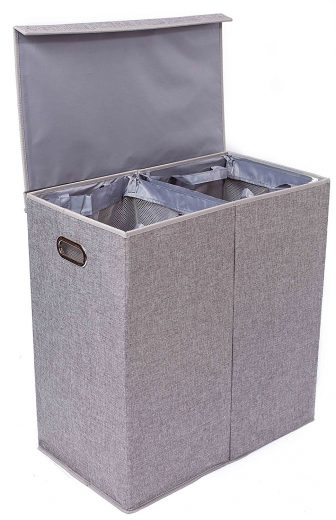 This is a somewhat regular feature I added awhile back to organize reader questions. I have a build up in my email inbox so I am doing some virtual housekeeping now.
This is a somewhat regular feature I added awhile back to organize reader questions. I have a build up in my email inbox so I am doing some virtual housekeeping now.
Reader Jen: My plastic laundry baskets are falling apart and I really need to replace them. Any ideas for a great eco-friendly solution? I haven’t thought of anything I can re-purpose for hauling my clean laundry upstairs and I’m not sure where to look (preferably locally) for something made with sustainable materials and eventually biodegradable. Any ideas for me?
NatureMom: Well, Jen you have a few options in eco friendly laundry baskets. For one thing the metal frame baskets with cloth liners that you find in big box stores are not to shabby. If you want local you can also canvas yard sales. Even if you don’t find laundry baskets you may find something else that can be re-purposed into a laundry collection unit. ;) Wooden egg crates or wood barrels come to mind.
You could go with a wicker or bamboo basket too. They are natural and they will biodegrade when you are ready to toss them. They have a few on Amazon too…
Reader Teresa: Hi Tiffany! Have you looked into these? I have had a Brita in the past and loved having cold, filtered water right out of the fridge. I have heard though, that there is some BPA in the filters. Do you know of any safe alternatives?
NatureMom: Great question! Buying bottled water presents a serious plastics problem for our planet but tap water may be down right nasty to drink. So the more eco friendly option would be to filter your tap water at home and assuming that a whole house filtration system is not in the budget that means having some sort of portable system.
As far as I know Brita’s filter, filter canister, and pitcher are made of 100% polypropylene plastic. Polycarbonate plastics are the big BPA culprits. The Soft Landing has a good article on this very topic. So its appears that Brita is a good brand for you. They also recycle their filters.
The water filter that I have (and that you see in this video) is from Zero Water. It has a pretty darn impressive 5-Stage filtration and a push button dispenser for in-fridge use. I hope to get a review up for it very soon. It has no BPA plastics in it and they have a filter recycling program. They also offer an awesome filter bottle that fits on top of a water cooler. It is quite awesome since conventional water cooler bottles do have BPA I believe.
Reader Wendy: I was thinking that at least buying locally is better than store bought and cheaper, so I was trying to do that. However, it was not organic. I thought it was still a good compromise. But I have read things lately that are making me wonder. When I thought I was doing good… did I do bad?
NatureMom: Ah yes, the question we probably ALL ask ourselves. If you have a choice between organic but not local OR local and not organic which is best? Well, this one doesn’t have an easy answer. There are people who argue for both sides and insist their way is best. Eating local as much as you can without regard to organic may be better for the planet but eating only organic may be better for the body. Of course if you toss air and soul pollution into the mix with organics the answer becomes muddled. And if you think about how pesticide use destroys our soil then local become muddled.
Here is my take on it…just do your best. If you are shopping at farmer’s markets and “you pick” farms you are likely getting pretty close to organic because small farmers don’t have the budget for mass quantities of chemicals. Talk to them and find out how they grow the food. You may be surprised to find that many are organic… they just don’t have the expensive certification. Balance that with some non local foods that are certified organic. I buy local and organic whenever I can and when I can’t I just do the best I can. But continue to ask your local farmers and grocers for local, organic foods and you may just eventually see the change you want.
Reader Sarah: My hang-up is that there always seems to be so many more things I could do that it feels overwhelming. And then I feel like the things I am doing, aren’t enough. Also, and especially now in this economic crisis, buying organic and other green products is more expensive (sometimes twice the cost of the regular product), that it feels irresponsible financially. I know that may sound horrible. Anyway, I’m hoping you can pass along some insight as to how you make things work for you and your family. And stay sane. ;-)
NatureMom: I understand your frustration Sarah but in order to stay sane I recommend not trying to do too much at once. I have a wish list that I keep of green changes, green products, green renovation ideas, etc that I use to keep track of my goals. I do this because I cannot afford to go whole hog and do it all at once. So I do it little by little.
For instance in my kitchen you will find bamboo cutting boards, wooden cooking utensils, green (Teflon free) non-stick cookware, recycled colanders, stainless steel and ceramic mixing bowls, glass refrigerator dishes, etc. I did not buy all these things at once. I just made and inventory of what I need to change… paper towels replaced by cloth rags, plastic cooking utensils replaced by wood or metal… and I worked on those things one at a time. I still do this.
And as much as you can try to utilize the green ideas that actually SAVE you money and you will have a lot more wiggle room in the budget to work with.



